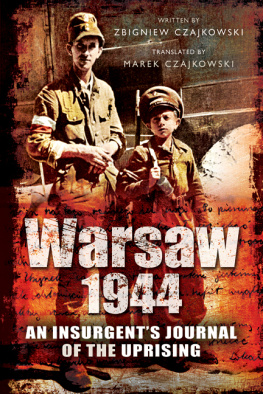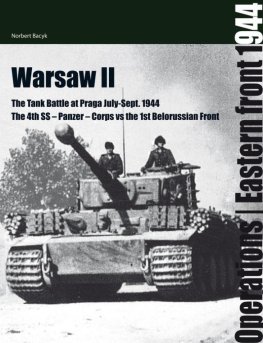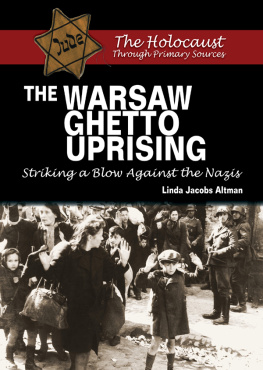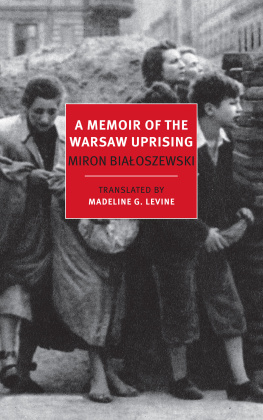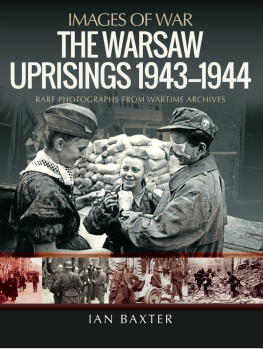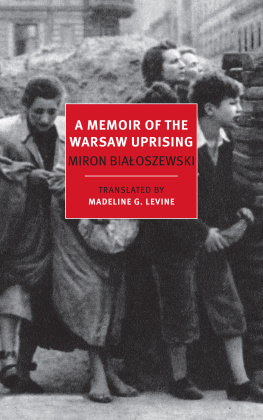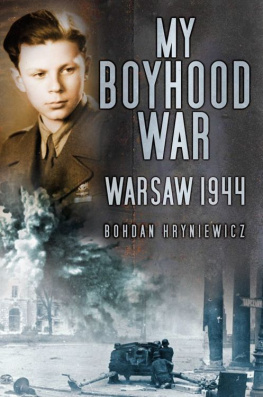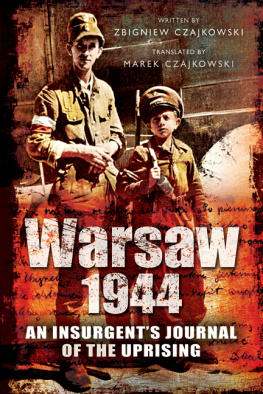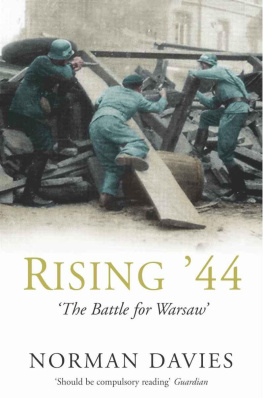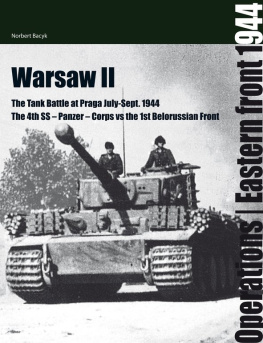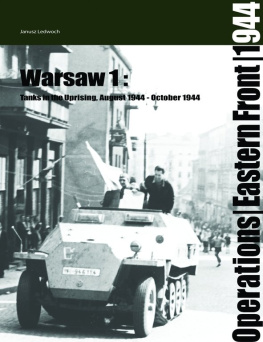

First published in Great Britain in 2012 by
PEN & SWORD MILITARY
An imprint of
Pen & Sword Books Ltd
47 Church Street
Barnsley
South Yorkshire
S70 2AS
Copyright Zbigniew George Czajkowski, 2012
ISBN 978-1-78159-058-4
eISBN 978-1-78337-865-4
The right of Zbigniew George Czajkowski to be identified as the author of this work has been asserted by him in accordance with the Copyright, Designs and Patents Act 1988.
A CIP catalogue record for this book is available from the British Library.
All rights reserved. No part of this book may be reproduced or transmitted in any form or by any means, electronic or mechanical including photocopying, recording or by any information storage and retrieval system, without permission from the Publisher in writing.
Typeset by Concept, Huddersfield, West Yorkshire.
Printed and bound in England by the MPG Books Group.
Pen & Sword Books Ltd incorporates the Imprints of Pen & Sword Aviation,
Pen & Sword Family History, Pen & Sword Maritime, Pen & Sword Military,
Pen & Sword Discovery, Wharncliffe Local History, Wharncliffe True Crime,
Wharncliffe Transport, Pen & Sword Select, Pen & Sword Military Classics,
Leo Cooper, The Praetorian Press, Remember When, Seaforth Publishing and
Frontline Publishing.
For a complete list of Pen & Sword titles please contact
PEN & SWORD BOOKS LIMITED
47 Church Street, Barnsley, South Yorkshire, S70 2AS, England
E-mail: enquiries@pen-and-sword.co.uk
Website: www.pen-and-sword.co.uk
Contents
List of Plates
Introduction
After the defeat in 1939 Poland was occupied by Nazi Germany and her Eastern territories by the Soviet Union. A Polish Underground was formed which comprised of clandestine educational systems, social organisations, the Boy Scout movement, and a military resistance movement. Many young people considered their duty to join. Military battalions were organised from Boy Scout units. In 1941 the German-Soviet war began and by 1944 the Soviet army had advanced into Poland. The military command of the Home Army (the Armia Krajowa or AK) decided against an uprising in Warsaw at that stage and most weapons amassed in the city were despatched in the Spring to the partisans outside Warsaw. However, when the Soviet army approached the River Vistula in July 1944, the command decided to liberate Warsaw by itself. The Uprising began on 1 August. Because of the shortage of arms and ammunition, particularly those suitable for fighting in built-up areas, practically no German strong-points were taken and no East-West road or strategically important train routes were intercepted. After the first week of fighting the insurgents lost their offensive initiative and for almost two months thereafter defended themselves in isolated districts which the Germans took over one by one, up to the beginning of October 1944, when the City Centre surrendered. The heaviest battles took place in the city districts of Wola and the Old Town. Most of the highly trained Scout units in these districts suffered heavy losses, and almost all the survivors were wiped out in the district of Powile, when they tried to join the Polish battalion under Soviet command that took part in an unsuccessful crossing to the western bank of the Vistula.
The author of Warsaw 1944 An Insurgents Journal of the Uprising belonged to the generation of independent Poland which became known as the Columbus Generation. These were admirable young people, in most cases teenagers in 1939. Born into a free and independent Poland after the First World War, they were trapped in the events of the Second World War. They experienced its cruelty and if they survived, in many cases left Poland to become emigrs in many different countries around the world.
Zbigniew Dbczyski was born in Warsaw to a family of doctors. His father, an army surgeon, died in a car accident when Zbigniew was very young. His mother was a well known and much respected doctor, devoting herself to many, mostly poor, patients. During the German occupation she became deeply involved in the Underground Resistance movement, working closely with the High Command of the Home Army. Her activities were discovered by the Gestapo who broke into their apartment and shot her on the spot. Zbigniew who was in the next room, managed to jump out of a window, slide down the drainpipe into the courtyard and escape.
From that moment life for this teenage boy was one of conspiracy, using the name of Czajkowski from then on. He continued his education in a secret study group organised by the teachers of one of the top Warsaw schools, the Lelewel. Teachers would go from one private house to another, at the risk of dire punishment, teaching small groups of pupils. At the same time he was involved with Underground Boy Scout movement, which took the name of Grey Ranks, with aims different from those of the pre-war years (although perhaps not that different from those set by the creator of the movement, Baden-Powell).
In 1942, at the age of sixteen, Zbigniew already belonged to the so-called Battle Schools (BS) concerned, among other things, with minor sabotage. He then joined the Assault Groups (GS). Apart from intensive training he took part in a number of subversive acts against the occupying forces. That period of his life and his activities are briefly described in his journal.
In August 1943 a new Scout Battalion was created from those who took part in military action. It was named Zoka after the pseudonym of the recently killed commander Tadeusz Zawadzki. When a sister battalion was formed in 1944 named Parasol (umbrella) Zbigniew was transferred to it as a patrol leader. His commanding officer was the battalions second-in-command, the poet Krzysztof Kamil Baczyski, later recognised as one of the greatest poets of his generation.
At the start of the Uprising, the Parasol went into action in the district of Wola. But orders did not arrive in time to Zbigniews patrol. It found itself instead in the Theatre Square and fought there in the first days of the Uprising. On the fourth day of fighting his superior officer Baczyski was killed. The description of his death in Zbigniews journal, which appeared in the Polish Press in 1948, was a valuable account of the early days of the Uprising and the circumstances surrounding the death of the great poet.
Warsaw 1944 An Insurgents Journal of the Uprising is an exceptional book, written in plain, unpretentious prose, and its reader is moved by its authenticity, directness and restraint. It is instinctively a work of great literary merit. Concise, almost dispassionate descriptions of many terrible experiences in the short and at the same time long month of August 1944 in the Old Town, the main period on which the author has concentrated, make a strong impact. Here Corporal Deivir (his pseudonym) not yet eighteen, commanding a patrol of colleagues of a similar age, after years of preparation in conditions of conspiracy, set out to defend his and their city from the hated and cruel occupiers. He was deeply conscious of his responsibility for them. Already twice wounded he tried to protect them as much as he could, yet the situation continued to develop in the worst possible way. In the final days Corporal Deivir became a helpless witness while they, one by one, almost to the last one, perished. Superhuman efforts to help the wounded were thwarted by renewed, ever worsening blows. No reader will forget such scenes as the attack on the Stawki Street, the burial under rubble of the hospital in Pamfil, or the last fight by the Town Hall. In these hundred pages of Deivirs account is contained the whole magnitude of heroism and futility in battle.
Next page
